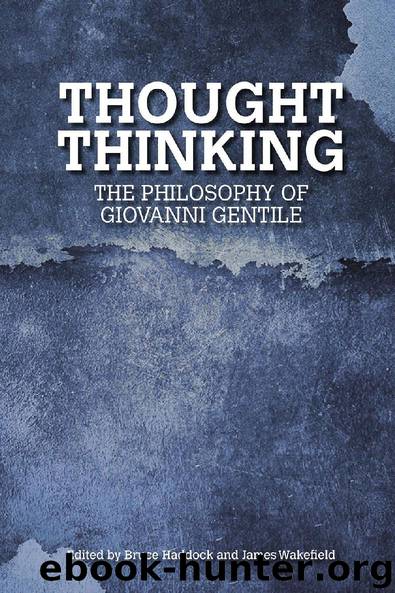Thought Thinking by Bruce Haddock & James Wakefield

Author:Bruce Haddock & James Wakefield
Language: eng
Format: epub
Tags: Gentile, philosophy, idealism, fascism, politics, history, immanence, actualism, moral philosophy, education, modernity, philosophy of history, Collingwood
ISBN: 9781845408503
Publisher: Andrews UK Limited 2015
Published: 2015-07-14T00:00:00+00:00
Dunham cum suis are quite surprised to find this autopoetic theory in biology, and point to possible predecessors like J.C. Smuts and A.N. Whitehead. [41] But given the many similarities between the characteristics of autopoiesis and Gentile’s autoctisi, it seems that autopoietic thinking was linked to idealism before these thinkers, and not in the context of science, but of history. Indeed, in spite of the fact that Maturana and Varela developed their ideas in the context of biology, whereas Gentile developed his ideas in the context of philosophy and history, the latter would have subscribed to each of the points in the above list.
Firstly, by identifying the dialectic of thought with autoctisi, he could reject the notion of thought as a representation of reality as the neo-Kantians and the early Croce still held. [42] At the same time, by identifying autoctisi with thought, Gentile could distance himself from thinkers like Dilthey, Bergson, and Bradley, who tried to explain reality in terms of immediate experience. [43] Secondly, the notion that thought is creative, in the sense that it brings forth a world, is central to Gentile’s notion of autoctisi and forms the basis for his identity of thought and action. Thirdly, the idea that cognition is coextensive with life and experience is identical with Gentile’s idea of absolute immanentism, which equates thought with experience of reality. Fourthly, since Gentile limited his notion of autoctisi to human thought, he would probably object to the application of the notion to the cognition of all living creatures. But he did hold that within autoctisi, thought went all the way down to sensation, and all the way up to collective thought. In fact, the latter idea was the kernel of his interpretation of the Transcendental Ego as ‘the one who thinks for all’. [44] Finally, and most importantly, Gentile could not but agree with Maturana and Varela’s view that ‘knowing is effective action’, because, like autopoeisis, autoctisi describes how thought posits itself and its object in a single act which is constitutive of reality.
Also on the negative side, modern cognitive biology and Gentile’s idealism correspond for both have been accused of subjectivism and even solipsism. [45] This accusation is even more pertinent to Gentile’s philosophy, because, unlike Varela and Maturana, he still clung to the human subject as the centre of the autopoietic dialectic of thought. In what follows, I will discuss how Gentile addressed the charge of subjectivism in his philosophy of history, but first I will deal with the elaboration of his autopoietic dialectic of thought in the philosophy of mind. [46]
5. Pedagogia e Filosofia : Rolling out Autopoiesis.
The first field to which Gentile applied his autopoietic logic was education. In his first systematic work, the 1912 Sommario di pedagogia, he unrolls it over the entire philosophy of mind from sensation to action. This analysis results in the famous identity of philosophy and education which recognizes the relationship between teacher and pupil as a single process between two self-creative minds. [47] On this
Download
This site does not store any files on its server. We only index and link to content provided by other sites. Please contact the content providers to delete copyright contents if any and email us, we'll remove relevant links or contents immediately.
The remains of the day by Kazuo Ishiguro(8946)
Tools of Titans by Timothy Ferriss(8346)
Giovanni's Room by James Baldwin(7301)
The Black Swan by Nassim Nicholas Taleb(7086)
Inner Engineering: A Yogi's Guide to Joy by Sadhguru(6776)
The Way of Zen by Alan W. Watts(6575)
Asking the Right Questions: A Guide to Critical Thinking by M. Neil Browne & Stuart M. Keeley(5740)
The Power of Now: A Guide to Spiritual Enlightenment by Eckhart Tolle(5723)
The Six Wives Of Henry VIII (WOMEN IN HISTORY) by Fraser Antonia(5484)
Astrophysics for People in a Hurry by Neil DeGrasse Tyson(5169)
Housekeeping by Marilynne Robinson(4420)
12 Rules for Life by Jordan B. Peterson(4292)
Double Down (Diary of a Wimpy Kid Book 11) by Jeff Kinney(4252)
The Ethical Slut by Janet W. Hardy(4232)
Skin in the Game by Nassim Nicholas Taleb(4223)
Ikigai by Héctor García & Francesc Miralles(4219)
The Art of Happiness by The Dalai Lama(4115)
Skin in the Game: Hidden Asymmetries in Daily Life by Nassim Nicholas Taleb(3973)
Walking by Henry David Thoreau(3938)
